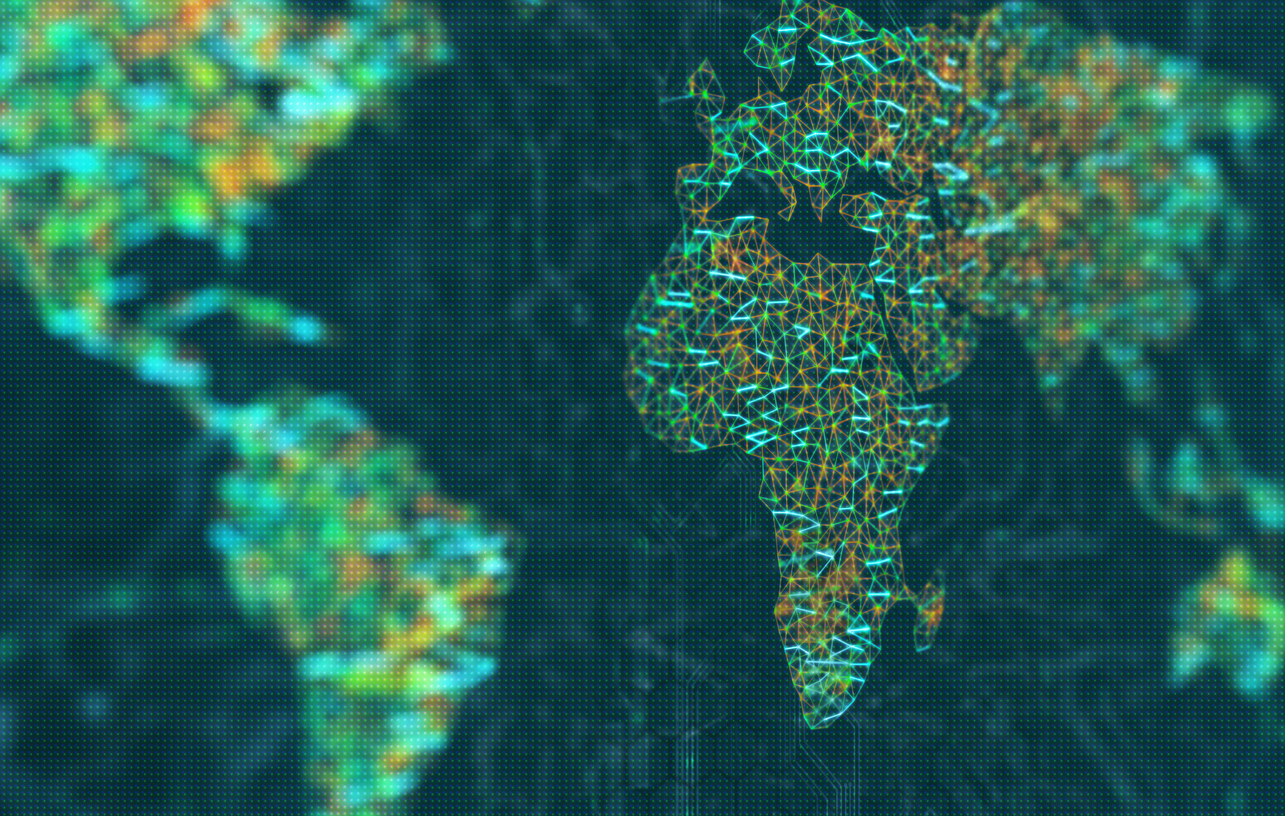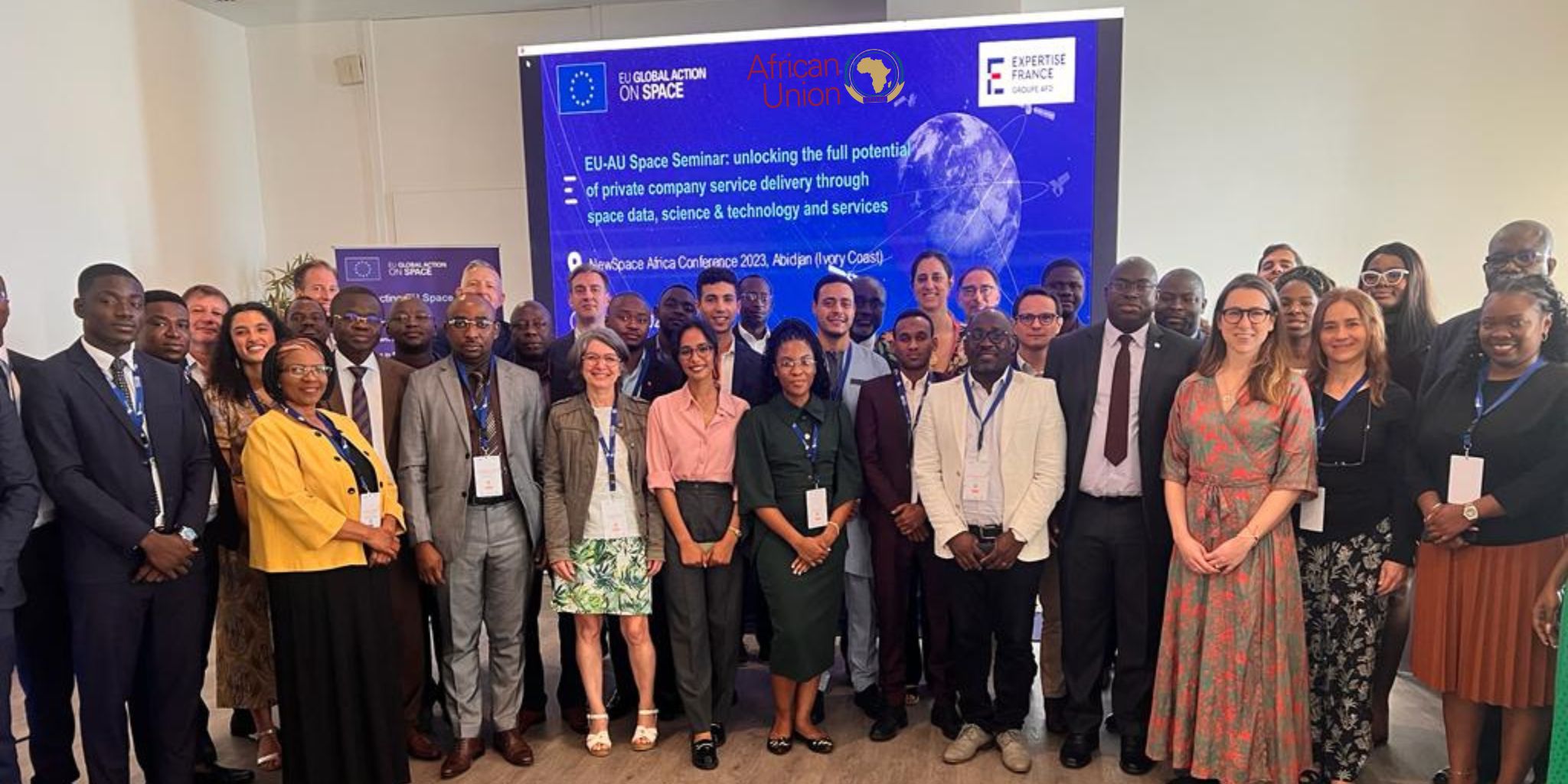Strengthening the Africa-EU space partnership: space cooperation between the European Union and Africa Union shines at the NewSpace Africa Conference 2023

24 May 2023
The NewSpace Africa Conference 2023 saw the EU and AU moving one step further in their multi-layered space partnership. The two Unions enjoy long-lasting cooperation in the field of space, and the EU is grateful to be recognised once again as a reliable space partner of the African Union and its Member States.
Taking place in the vibrant backdrop of Ivory Coast’s capital Abidjan, the Conference brought together the entire value chain of the African space ecosystem, from pan-African organisations and national space agencies to the bustling NewSpace industry made of emerging startups, investors and business accelerators.
But the Conference also presented the perfect opportunity for European and African representatives to reaffirm their respective commitments to collaboration in space and discuss the deepening of common efforts as well as new areas of cooperation. On that occasion, the EU and the AU jointly organised three events in line with the overarching theme of the Conference: “Space for Africa’s socioeconomic transformation”.
The key initiatives underpinning the Africa-EU space partnership took centre stage at the Africa-Europe Roundtable on Space Cooperation organised on 26 April, while the EU-AU Space Seminar the following day provided a platform to NewSpace actors and space agencies to delve into the unmet needs of the African market and explore financial and training instruments available to private actors. Finally, the EU supported the GMES and Africa Startups Development Programme with the organization of an ad-hoc training on digital entrepreneurship.
The Africa-EU partnership in space
From Earth Observation (EO) and satellite communications to Positioning, Navigation & Timing (PNT), space cooperation between Africa and Europe touches multiple domains. The panellists acknowledged the support and funding of the EU directed towards joint programmes, most notably the Global Monitoring for Environment and Security and Africa (GMES & Africa) programme, which has opened the doors for widespread Copernicus data usage among African stakeholders.
But GMES & Africa is as much about satellite data as training opportunities; indeed, the Conference offered an ideal setting to announce the 15 winners of the GMES & Africa Startups Development Programme. Launched in February 2023, the programme culminated with the organisation of a 2-day physical training to provide guidance to African talents on the commercialisation of their Copernicus-powered innovative solutions sponsored by the EU.
With regards to satellite navigation, the EU and Africa enjoy a fruitful collaboration through the EU-ASECNA agreement and the Joint Programme Office for Satellite Navigation in Africa (JPO); building on the experience of EGNOS and Galileo, cooperation between the EU and Africa in the field of satellite navigation allows for the constant exchange of know-how on Satellite-Based Augmentation Systems (SBAS), and is supporting Africa in the development and implementation of its own SBAS, the ASECNA-led ANGA project. In the near future, the EU and AU are set to intensify cooperation also in the domain of satellite-based communication.
From a more general perspective, the panellists stressed that sustainable development and digital transformation should continue to be the focus of EU-Africa cooperation in space; at the same time, join initiatives should strive to involve stakeholders at all levels, from policymakers and the industry to local communities and civil society, and take advantage of potential synergies between domains to maximise the added value of cooperation. The ownership factor was under the spotlight throughout the Roundtable; indeed, the goal to develop domestic African solutions that serve local needs is a common denominator in all joint EU-AU initiatives. In this regard, the speakers also positively welcomed the establishment of the African Space Agency, heralding the consolidation of a unified voice in space affairs for the whole of Africa.
Furthermore, the speakers collectively acknowledged the essential role of Research and Development (R&D) in the space domain, underlying the importance of a market-orientated research model, shared responsibilities between decision-makers and researchers, and the development of autonomous African capabilities.
The private sector as a pillar of Africa-EU space cooperation
With the African space sector expected to grow by 16% by 2026 compared to 2021 figures, Africa is indeed “the new frontier for Space Business” as the Space Science Expert and Coordinator for GMES & Africa Programme Mr. Tidiane Ouattara put it during the Conference. The EU-AU Space Seminar on 27 April gave the spotlight to space entrepreneurship and Business-to-Business partnerships, which are increasingly playing a crucial role in Africa-EU cooperation in space.
The intro session of the seminar provided participants with background knowledge on the state of the African space industry, focusing on its downstream segment and applications. Subsequently, panels of European space experts and African entrepreneurs discussed the role of space data in achieving a green and digital future, sharing experiences from the European context and the success stories of African businesses.
The seminar saw the speakers identify multiple gaps that cooperation between European and African businesses could help bridge. Through the combined use of Copernicus geospatial data, Galileo & EGNOS signals and downstream applications developed by African users, space can represent both an invaluable tool to face impending challenges and an instrument to boost sustainable development, the green transition and digital transformation in the continent. Discussions put an emphasis on the thematic areas of agriculture & natural resources, environmental challenges and marine and coastal areas monitoring, which hold particular importance in Africa’s socio-economic landscape.
But how does the public sector support NewSpace companies? In this respect, the European Union is engaged in a number of initiatives: beside the training opportunities available under the GMES & Africa Programme, and cooperation with ASECNA and JPO in the field of satellite navigation, the EU is providing business coaching and internationalisation support to EU and African entities through its Global Action on Space.
Space agencies have also set up their own means to assist the private industry; the closing session of the seminar featured interventions by representatives of the European Space Agency and the Egyptian Space Agency, who highlighted their respective support offered through financial and non-financial instruments as well as incubation and entrepreneurship programmes.
A forward-looking partnership anchored to shared goals
Cooperation in space between the European Union and the African Union has been strengthened through a number of new objectives which denote fruitful and long-lasting relations. With the African Union’s Agenda 2063, the AU is committing towards a Pan-African renaissance where space represents an important element; according to Aspiration 7: Africa as a strong, united, resilient and influential global player and partner, the AU aspires to become a major partner in global affairs, including in the domain of space. This aspiration is echoed by the EU’s commitment to represent a trusted and reliable partner for Africa.
Space is also mutually recognised as a crucial component in the green transition and the digital transformation of the African continent, in line with the EU’s recently announced Global Gateway strategy and the comprehensive Africa-EU partnership. As mentioned previously, the importance of these two pillars was reaffirmed during the Conference by representatives of the two blocks.
On a global level, Space cooperation between the European Union and African Union and its Member States actively contributes to the achievement of the 2030 Agenda for Sustainable Development thanks to the use of space data and signals in a number of strategic applications; for instance, it supports Goal 2: Zero Hunger thanks to the EO data and applications of the GMES & Africa Programme and Goal 3: Good health and well-being through the deployment of an African SBAS that provides ultra-precise positioning signals, decreasing flights’ durations and consequently their carbon emissions.
The Africa-EU partnership in space is bearing fruits thanks to the reliable commitment of the two partners and will continue to improve the lives of the respective citizens through knowledge-sharing and joint initiatives, in particular thanks to the implementation over the next years of the forthcoming, multimillion Africa–EU space partnership programme.
→ Read more about the Africa-EU Partnership
→ Learn more about the GMES & Africa Programme
→ Learn more about the Joint Programme Office for Satellite Navigation in Africa (JPO)
→ Explore our global market report for Africa
Take a glance at the best pictures of the events below:


